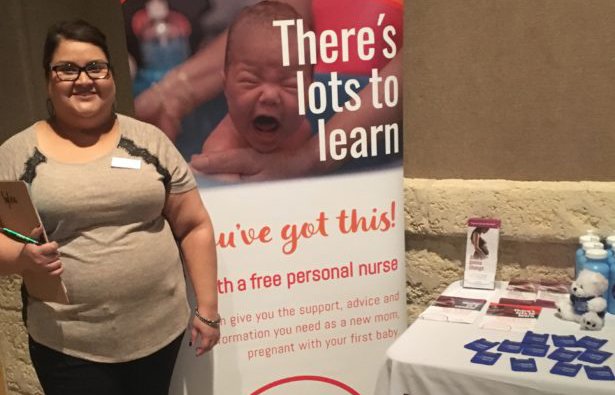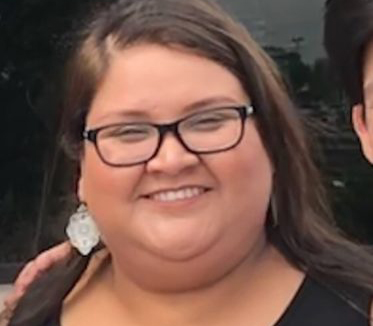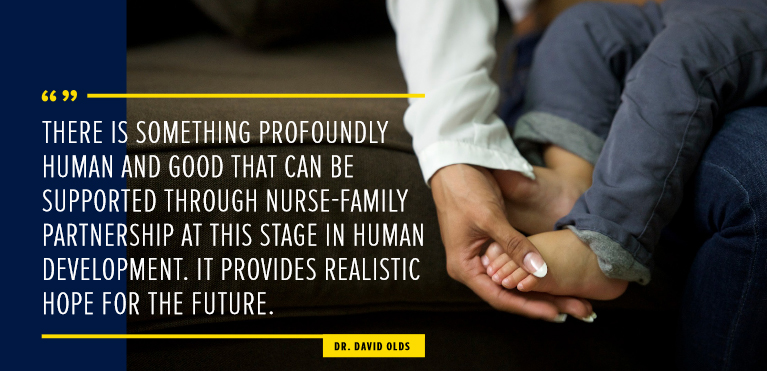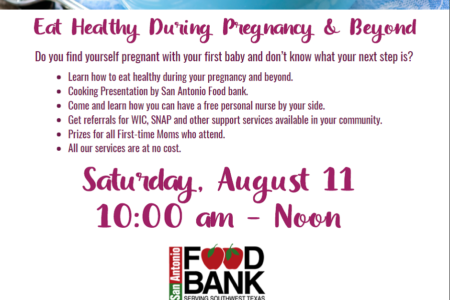
Share On Social!
Sylvia Lopez knows low-income mothers need lots of support in South Texas and San Antonio.
Lopez knows the research that shows Latino kids start kindergarten behind their peers, experience many childhood traumas, and are at risk of not getting the proper care, services, and environment they need for healthy formative development.

That’s why Lopez is connecting in-need pregnant women to home visits from nurses to ensure healthier pregnancies, families, and children, through a South Texas application of a national program—the Nurse-Family Partnership.
See how the program works and how it’s helping South Texas moms, children, and families!
The National Nurse-Family Partnership
The Nurse-Family Partnership got its start in the 1970s.
David Olds, who had just graduated from Johns-Hopkins University, worked at an inner-city daycare center in New York. He cared for preschoolers damaged by abuse, and suffering the effects of their parents’ struggles.
“[Olds] wanted to help those children, but realized the best chance for giving them a better start in life was to provide that help much earlier, when they were infants—or even before they were born,” according to the partnership website. “That realization led Olds to create a program that created supportive relationships between trained nurses and first-time, at-risk moms.”
 In 1977, Olds tested the partnership in New York, then additional sites in Tennessee and Colorado.
In 1977, Olds tested the partnership in New York, then additional sites in Tennessee and Colorado.
In 1996, the partnership started being replicated across the country. Today the partnership helps women and families in 42 states.
In each state, the partnership is comprised of passionately committed individuals who work to transform the lives of some vulnerable individuals—first-time mothers and or low-income families.
The partnership directly hires nurse home visitors, nurse supervisors, and other professionals in their communities to deliver the program and serve first-time low-income parents. Nurses conduct home visits to support these women to improve pregnancy outcomes, family self-sufficiency, and child health and development.
“The expectant moms benefit by getting the care and support they need to have a healthy pregnancy,” according to the program website. “At the same time, new mothers develop a close relationship with a nurse who becomes a trusted resource they can rely on for advice on everything from safely caring for their child to taking steps to provide a stable, secure future for them both.”
“Through the partnership, the nurse provides new moms with the confidence and the tools they need not only to assure a healthy start for their babies, but to envision a life of stability and opportunities for success for both mom and child.”
The Nurse-Family Partnership in South Texas and San Antonio
Sylvia Lopez works in the South Texas region as an outreach worker for the Nurse-Family Partnership.
In this largely Latino region, the partnership helps create long-term relationships between first-time mothers and nurses via regular home visits. Nurses work with mothers on pregnancy health, parenting skills, and setting goals for everything from employment to education for themselves and their children.
 Trust builds between the family and the visiting nurse, which motivates the mothers, Lopez said.
Trust builds between the family and the visiting nurse, which motivates the mothers, Lopez said.
For example, in the Rio Grande Valley, new mother Vanessa Bocanegra is enrolled in the partnership and works with nurse Gabby Calzada. Six months into her pregnancy, Bocanegra was diagnosed with a liver condition called cholestasis. She leaned on the help of the nurse program for support, KTXS-TV reports.
“When Gabby came, she taught me how to be patient and that’s how my love for my son grew stronger, because I knew what to do,” said Bocanegra.
In San Antonio, community outreach occurs at three major locations:
- Catholic Charities of the Archdiocese of San Antonio
- San Antonio Children’s Shelter
- UT Health San Antonio
Lopez and the partnership communicate with nurses at these locations. Each nurse can have up to 25 pregnant women at a time. Every pregnant woman communicates to these nurses initially for one hour every week. Later, duration is increased accordingly.
Lopez said the partnership is successful.
It has reduced the number of repeat unwanted pregnancies and met educational goals for kids and moms. It also has promoted safe sleep practices that can prevent smothering deaths of infants and toddlers.
Reaching vulnerable first-time pregnant women can be a big hurdle, she shared, and it’s rewarding to see them get connected with a personal nurse and achieve their goals.
Spreading the Word in San Antonio

In San Antonio, lack of awareness of the program is the biggest obstacle.
To help, the Nurse-Family Partnership team in San Antonio is organizing a cooking class on Aug. 11, 2018, in partnership with the San Antonio Food Bank. The class aims to promote healthy food habits during pregnancy and beyond. All the services are available at no cost.
The class will be conducted at 1209 South Saint Mary’s, 2nd Floor, San Antonio, Texas 78210 from 10 a.m. to 12 p.m. Participants will get free gifts. All the ingredients used in the class can be easily purchased via the Women Infants and Children Program (WIC).
For detail and registration, contact Lopez at Sylvia.lopez@nursefamilypartnership.org.
Are you a mom looking for help? Visit www.nfpmoms.org, find a nurse near you, or call at 844-637-6667.
Are you a community leader looking to get involved with the partnership? Learn more about the program!
Explore More:
Maternal & Child HealthBy The Numbers
20.7
percent
of Latino kids have obesity (compared to 11.7% of white kids)
This success story was produced by Salud America! with support from the Robert Wood Johnson Foundation.
The stories are intended for educational and informative purposes. References to specific policymakers, individuals, schools, policies, or companies have been included solely to advance these purposes and do not constitute an endorsement, sponsorship, or recommendation. Stories are based on and told by real community members and are the opinions and views of the individuals whose stories are told. Organization and activities described were not supported by Salud America! or the Robert Wood Johnson Foundation and do not necessarily represent the views of Salud America! or the Robert Wood Johnson Foundation.



